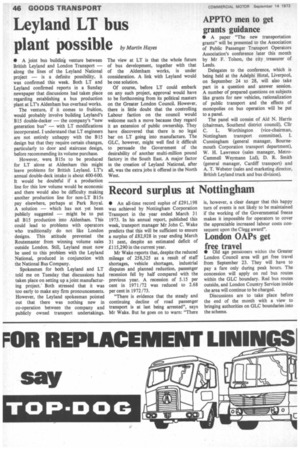Leyland LT bus
Page 48

If you've noticed an error in this article please click here to report it so we can fix it.
plant possible by Martin Hayes
• A joint bus building venture between British Leyland and London Transport — along the lines of the Leyland National project — is a definite possibility, it was confirmed this week. Both LT and Leyland confirmed reports in a Sunday newspaper that discussions had taken place regarding establishing a bus production plant at LT's Aldenham bus overhaul works.
The venture, if it comes to fruition, would probably involve building Leyland's B15 double-decker — the company's "new generation bus" — with LT modifications incorporated. I understand that LT engineers are not entirely unhappy with the BI5 design but that they require certain changes, particularly to door and staircase design, before recommending its volume purchase.
However, were, B 15s to be produced for LT alone at Aldenham this might leave problems for British Leyland. LT's annual double-deck intake is about 400-600. It would be doubtful if a production line for this low volume would be economic and there would also be difficulty making another production line for non-LT B 15s pay elsewhere, perhaps at Park Royal. A solution — which has not yet been publicly suggested — might be to put all B15 production into Aldenham. This could lead to problems with operators who traditionally do not like London designs. This attitude prevented the Routemaster from winning volume sales outside London. Still, Leyland must now be used to this problem with the Leyland National, produced in conjunction with the National Bus Company.
Spokesmen for both Leyland and LT told me on Tuesday that discussions had taken place on setting up a joint manufacturing project.' Both stressed that it was too early to make any firm pronouncements. However, the Leyland spokesman pointed out that there was nothing new in co-operation between the company and publicly owned transport undertakings. The view at LT is that the whole future of bus development, together with that of the Aldenham works, is under consideration. A link with Leyland would be one solution.
Of course, before LT could embark on any such project, approval would have to be forthcoming from its political masters on the Greater London Council. However, there is little doubt that the controlling Labour faction on the council would welcome such a move because they regard it an extension of public ownership. They have discovered that there is no legal bar on LT going into manufacture. The GLC, however, might well find it difficult to persuade the Government of the desirability of another multi-million pound factory in the South East. A major factor in the creation of Leyland National, after all, was the extra jobs it offered in the North West.




































































































































